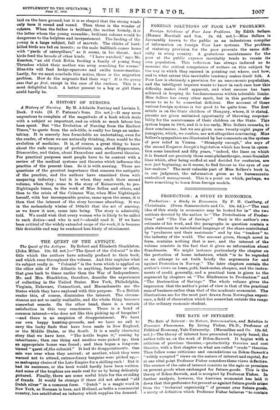FOREIGN SOLUTIONS OF POOR LAW PROBLEMS.
Foreign Solutions of Poor Law Problems. By Edith Sellers. (Horace Marshall and Son. 2s. 6d. net.)—Miss Sellers is favourably known to the public as an industrious compiler of information on foreign Poor Law systems. The problem of statutory provision for the poor presents the same diffi- culty in every country. A gratuitous maintenance for the poor at the public expense inevitably tends to create Its own population. This reflection has always induced us to measure the critical competence of writers on this subject by the way in which they succeed in pointing out where, and how, and to what extent this inevitable tendency makes itself felt, A Poor Law is obviously a provision for an uneconomic populetken, and the intelligent inquirer wants to know in each ease how this difficulty makes itself apparent, and what success has been achieved in keeping its burdensomeness within tolerable limits. Miss Sellers has every other merit, but in this particular she seems to us to be somewhat deficient. Her account of thee° various foreign systems is too good to be quite true. The first article is on the State children of Hungary, where, it is stated, parents are given unlimited opportunity of throwing respoinii- bility for the maintenance of their children on the State. This system began in 1903, and it is too early, Miss Sellers remark, to draw conclusions ; but we are given some twenty-eight pages Ce panegyric, which, we confess, are not altogether convincing. Miss Sellers's sympathies are illustrated by her comments on the system of poor relief in Vienna. "Strangely enough," she says ef the second Emperor Joseph's legislation which has been in opener tion some hundred and fifty years, "indeed, the lines on which it is framed are precisely those semi-philanthropic, semi-Socialist lines which, after being scoffed at and derided for centuries, are now just beginning, as it seems, to find favour in the eyes of our law-makers." The most valuable part of Miss Sellers's book is, in our judgment, the information given as to bureaucratic centralised management. This is a point on which, perhaps, we have something to learn from foreign models.






















































 Previous page
Previous page